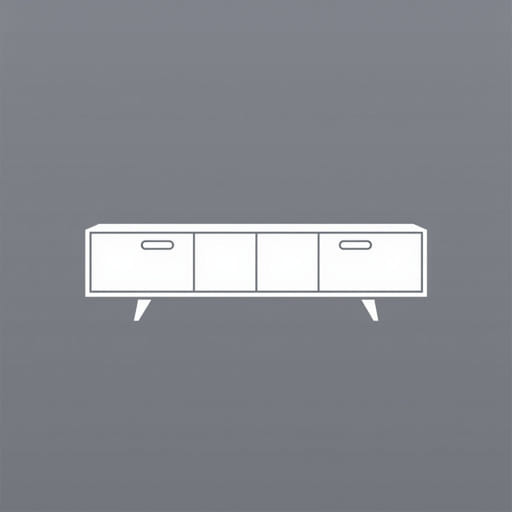A sideboard cabinet is one of the most versatile and functional pieces of furniture found in homes today. Traditionally used in dining rooms to store dishes, glassware, and linens, the sideboard has evolved in design and purpose. Its clean lines and practical storage space have made it a favorite not only in dining areas but also in living rooms, hallways, and even bedrooms. Whether you prefer modern minimalism or vintage charm, a sideboard cabinet offers both aesthetic appeal and practical utility, making it a staple for homeowners who value organization and style.
Definition and Purpose of a Sideboard Cabinet
What Is a Sideboard?
A sideboard cabinet, often simply called a sideboard, is a long, low storage unit with a flat top surface. Typically designed with cabinets, drawers, or a combination of both, sideboards are used to store dining essentials or display decorative items. The name sideboard comes from its common placement along the side of a dining room wall.
Primary Functions
Sideboard cabinets serve several core purposes, such as:
- Storing plates, bowls, utensils, and napkins
- Holding tablecloths, placemats, and serving trays
- Displaying art, lamps, or centerpieces on top
- Providing extra serving space during meals or parties
Modern sideboards may also house electronics, books, or personal items depending on where they are placed in the home.
Design Characteristics
Dimensions and Shape
Sideboard cabinets are generally rectangular in shape and stand between 28 to 36 inches tall. Their length varies widely, typically from 36 to 72 inches, allowing them to fit compact dining rooms or large open-plan areas. The shallow depth often around 18 inches ensures they don’t obstruct walkways or seating arrangements.
Storage Layout
The internal configuration of sideboards can vary:
- Drawers: Ideal for storing cutlery, linens, and small accessories.
- Cabinets: Useful for dishes, serving bowls, and larger items.
- Shelves: Open or concealed shelves can hold books, baskets, or decorative pieces.
Materials and Finishes
Sideboards can be crafted from various materials including solid wood, engineered wood, metal, glass, and even rattan. Finishes range from natural wood stains to painted surfaces in neutral or bold colors. Hardware accents like handles, knobs, or decorative inlays further enhance the cabinet’s style.
Types of Sideboard Cabinets
Buffet Sideboard
This variation typically stands a bit taller and is more common in traditional dining rooms. Buffets are ideal for serving food and storing dining essentials.
Credenza
Often used interchangeably with sideboard, a credenza usually has a sleek, low-profile design and is common in mid-century modern or minimalist interiors. It’s also popular in offices for storing supplies or electronics.
Console Sideboard
This type is narrower and often used in entryways or hallways. It offers a compact surface for keys, mail, or decorative accents while providing light storage underneath.
Modern Sideboards
These often feature clean lines, push-to-open doors, or even sliding panels. They tend to favor functionality over ornamentation and are made with contemporary materials like lacquer, tempered glass, or metal frames.
Uses Beyond the Dining Room
Living Room Storage
In a living room, a sideboard can function as a media console, bookshelf, or decorative unit. It provides a place to organize remote controls, cords, board games, and other miscellaneous items.
Hallway or Entryway Console
Placed near an entrance, a sideboard cabinet serves as a welcome station for daily essentials. You can store shoes in the cabinets, place a lamp on top, or use the drawers for wallets, masks, and more.
Bedroom Storage
In the bedroom, a sideboard can serve as an alternative to a dresser or vanity. It’s perfect for folded clothes, accessories, or even media equipment like a TV or sound system.
Home Office Utility
As home offices become more common, sideboards offer stylish storage for office supplies, printers, and paperwork. Their sleek designs help maintain a professional look while keeping clutter out of sight.
Choosing the Right Sideboard Cabinet
Measure Your Space
Before purchasing, measure the area where you intend to place the sideboard. Make sure there’s enough clearance for doors or drawers to open without obstruction.
Match Your Interior Style
Choose a sideboard that complements the existing furniture and decor. Whether you prefer farmhouse, mid-century modern, industrial, or Scandinavian styles, there’s a sideboard to match your aesthetic.
Evaluate Storage Needs
Think about what you’ll be storing. If it’s mostly flatware and linens, drawers are essential. For larger serving pieces or electronics, look for models with deeper cabinets and adjustable shelving.
Consider Material Durability
Solid wood sideboards are long-lasting and sturdy, while ptopicboard or MDF options are more affordable but may be less durable over time. For humid areas, metal or glass versions might be more suitable.
Care and Maintenance
Regular Cleaning
Wipe surfaces regularly with a soft cloth to remove dust. Use furniture polish or cleaner appropriate for the material to maintain shine and prevent buildup. Avoid placing hot dishes directly on the surface to prevent damage.
Protecting the Finish
To extend the life of your sideboard cabinet, use coasters and placemats. Avoid prolonged exposure to direct sunlight to prevent fading or discoloration.
Repair Tips
Small scratches can often be treated with wood touch-up markers or furniture wax. For larger damage, consider professional refinishing or using decorative overlays.
A Timeless Furniture Piece
The sideboard cabinet continues to be a favorite for both its elegance and practicality. From its roots in classic dining rooms to its modern roles in every corner of the home, the sideboard has proven to be a valuable piece of furniture. With its ample storage, flat display surface, and range of styles, it adds both charm and efficiency to any space. Whether you’re redecorating a dining area, optimizing a hallway, or creating extra storage in your living room, a sideboard cabinet can fulfill your needs while elevating your interior design.
